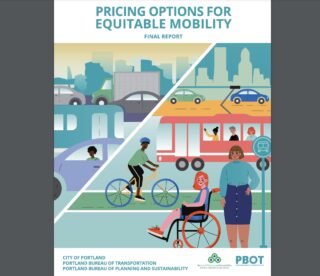
The free ride for car, truck and delivery drivers in Portland isn’t over, but the end has never been easier to see.
At City Council Wednesday, Mayor Ted Wheeler and the four other commissioners voted unanimously to adopt a resolution that will allow the City of Portland to develop a suite of new transportation-related fees. These “pricing strategies” include six near-term recommendations developed by the Pricing Options for Equitable Mobility (POEM) Task Force, an 18-member committee that spent 16 months hashing out the best ideas and putting them into a list of recommendations released back in July.
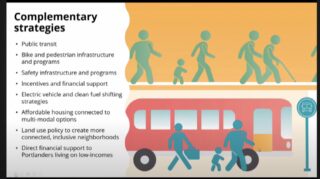
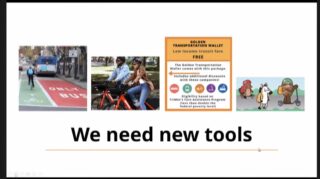
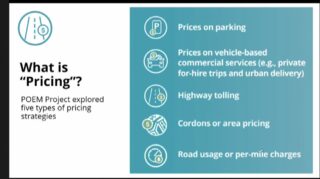
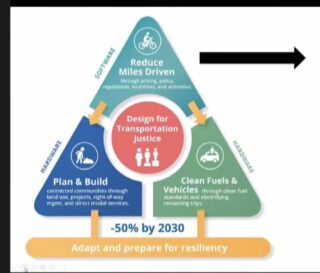
(Above: Slides presented at the council meeting Wednesday.)
Portland transportation planners and policymakers have known for years that putting a higher price on driving motor vehicles is imperative if we want to meet our climate and transportation goals. But charging people more to drive cars — in any shape, way or form — has always been a lightning rod of controversy. In progressive Portland, that controversy has been not only about the sacred American value of keeping driving cheap and easy, but also about equity. If we charge people more to use cars, the thinking has always gone, it would hurt low-income people and communities of color more than others (which isn’t really true, but narratives often trump facts).
So when the City of Portland put together the POEM Task Force in late 2019, they asked its members to, “Inform PBOT (Portland Bureau of Transportation) and BPS (Bureau of Planning and Sustainability)… if and how new pricing strategies could… be used more intentionally to improve mobility, address the climate crisis and advance equity…”
At Wednesday’s meeting we heard loud and clear from the task force: Yes pricing should happen, and it should happen quickly. Not only were the mayor and commissioners unanimous in their effusive praise of the POEM process, there was not one single voice in opposition.
To refresh, there are seven near-term recommendations from the Task Force:
Advertisement
Create a flexible commuter benefits program, requiring employers that provide free or subsidized parking to offer their employees that parking value in taxable cash income or alternative transportation benefits.
Create new priced on-street parking permit and meter districts and reduce the time and complexity involved in approving new districts, allowing the City to respond more flexibly and responsively to neighborhood parking demand.
Develop and implement a fee on privately-owned, off-street parking lots
Develop and implement a fee on urban delivery, including on-demand parcel and food delivery services
Modify the existing fee structure on private for-hire transportation (like Uber and Lyft)
The City should advocate for amending the Oregon state constitutional restriction that limits use of funds generated through taxes on motor vehicles.
Regarding highway tolling, the City should advocate for the recommendations and outcomes outlined in the Task Force letter on ODOT’s toll program (which encouraged revenue to be invested for non-highway uses) dated March 9, 2021.
A central city cordon (toll) zone, a local road user charge program, and dynamic parking pricing are three other recommendations that the Task Force sees as more longer-term policies that deserve consideration. Another strong theme from the Task Force and PBOT project staff was that pricing alone would fail without “complementary strategies” like boosting bikeways and buses. (At one Task Force meeting, members were given $9 each to re-invest pricing revenue. Transit service finished with the most money, followed by biking and walking infrastructure.)
What was particularly notable as I watched today’s meeting, wasn’t just the excitement for these policies from Task Force members, but how that excitement was shared by city staff and by all the members of the public who testified in support of them.
A sense of urgency ran through almost every comment uttered. Even PBOT Director Chris Warner made it clear his team is, “Ready to hit the ground running.” Vivian Satterfield, an environmental justice organizer with nonprofit Verde NW who was part of the invited testimony, said, “This is one of those policy levers we can activate now.”
Advertisement
There was even refreshingly candid acknowledgment from PBOT staff about how unbalanced our streets have become: “The climate crisis and significant carbon emissions coming from the transportation sector is just one of the costs coming from our very auto-centric system and one of the reasons we’re considering pricing,” said Project Manager Shoshana Cohen.
There were several bright spots during the testimony. One even came from a business owner who said the process converted him to being a believer in higher driving fees. “This is not at the expense of the business community,” he said. “These recommended changes are necessary to our success.”
Here are two more memorable bits if testimony.
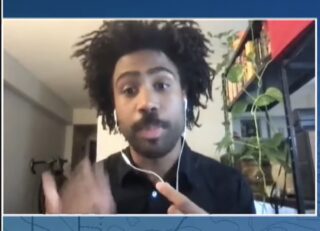
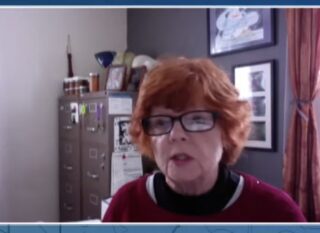
Task Force member Stephanie Frederick (spelling?) explained why she supported the policies even though she’s primarily a car user: “We car owners – I am one – don’t pay anywhere near the full cost of the driving we do,” she said. “We don’t pay for the asthma and other illnesses we inflict on exploited people trapped in housing along freeways on busy streets. We don’t pay for our role in the climate crisis that is most injurious to the most vulnerable amongst us. We don’t pay for noise, harm or economic losses due to congestion. It’s no wonder we’re out there in droves, doing damage.”
And The Street Trust Policy Manager André Lightsey-Walker gave testimony that was so convincing and inspiring several commissioners referred to it before voting “yes” a few minutes later. Here’s part of what he said:
“You will have the opportunity to set precedent, at a pivotal point in the region’s history, where conversations of pricing are coming up at local, regional, and state levels. Let’s work together to re-establish Portland as a global transportation leader and use our influence and successes as a model for how urban areas can do pricing right…
People will be angered by the prospect of paying for something they’ve cognitively established as free, whether it’s plastic bags, parking in their neighborhood, or crossing a bridge. And adverse response to this change is expected. However, as leaders in our community you have the unique responsibility of helping people understand that the things they perceived as free have actually been quite costly, causing generations of harm to our environment, health, and our most vulnerable communities, and that our current systems will continue to do so without urgent strategic and innovative intervention. I ask for your continued leadership as we move forward… designing streets for people is justice in action.”
Now that the POEM recommendations have been adopted, PBOT and BPS are bound by the resolution which calls on them to return to council within nine months, “with an update on all strategies and an implementation plan for the nearer-term equitable mobility fees and investments.”
Stay tuned.
— Jonathan Maus: (503) 706-8804, @jonathan_maus on Twitter and jonathan@bikeportland.org
— Get our headlines delivered to your inbox.
— Support this independent community media outlet with a one-time contribution or monthly subscription.


